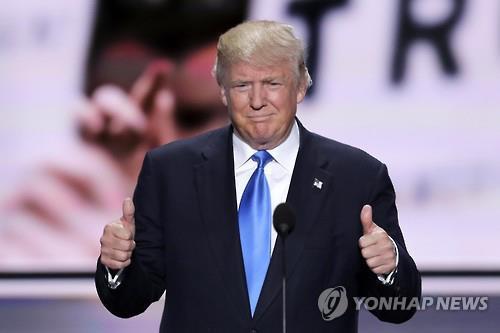- California Assembly OKs highest minimum wage in nation
- S. Korea unveils first graphic cigarette warnings
- US joins with South Korea, Japan in bid to deter North Korea
- LPGA golfer Chun In-gee finally back in action
- S. Korea won’t be top seed in final World Cup qualification round
- US men’s soccer misses 2nd straight Olympics
- US back on track in qualifying with 4-0 win over Guatemala
- High-intensity workout injuries spawn cottage industry
- CDC expands range of Zika mosquitoes into parts of Northeast
- Who knew? ‘The Walking Dead’ is helping families connect
Trump wants to ‘reevaluate’ trade, defense agreements to ensure they’re ‘win-win’ deals: aide
WASHINGTON, July 20 (Yonhap) — Republican presidential nominee Donald Trump wants to reevaluate free trade and defense agreements to ensure they are balanced ‘win-win’ deals and reflect changes since the deals were signed, an adviser to the nominee said.
Joseph Schmitz, a foreign policy and national security adviser to Trump, made the remark during a Foreign Press Center briefing on the sidelines of the Republican National Convention in Cleveland, Ohio, where Trump was officially named the Republican nominee for the November election Tuesday.
“Mr. Trump is not saying we don’t want to have trade deals. It’s just like our defense alliances, trade deals need to be reevaluated so that they actually make sense for both parties,” Schmitz said, according to a Foreign Press Center transcript.
“The nature of a deal, it’s a win-win relationship. And sometimes deals over time change based on circumstances that weren’t anticipated by the parties. And that’s all Mr. Trump is saying. We need to constantly reevaluate so that our deals with Korea and with any other nation are win-win deals,” he said.
The remark reinforces concern that Trump, if elected president, could seek to renegotiate the free trade agreement with South Korea that has been in effect since 2012 and is considered a symbol of the economic alliance between the two countries.
The real-estate business tycoon is also expected to try to renegotiate the deal with South Korea on how to share the upkeep cost of some 28,500 U.S. troops stationed in South Korea in order to force Seoul to shoulder most of the cost.
Schmitz dismissed concern that Trump has little experience in international relations.
“Mr. Trump is not only a successful businessman, he’s a successful international businessman. I mean he has been overseas. He understands that other parts of the world have special challenges that aren’t the same challenges we face in North America or necessarily in Europe and NATO,” he said.
Trump will also hire people “smarter than me about North Korea and South Korea,” he said.
Trump’s nomination has unnerved foreign countries, especially such allies as South Korea and Japan, as he has displayed deeply negative views of U.S. security commitments overseas, contending the U.S. should stop being the police of the world.
He has claimed that it makes no sense for the U.S. to help defend such wealthy allies as South Korea, Japan and Saudi Arabia in exchange for almost nothing. He argued that allies should pay 100 percent of the cost of stationing American troops, or the U.S. should be prepared to end their protection.
About 28,500 American troops are stationed in South Korea to deter North Korean aggression, a legacy of the 1950-53 Korean War, which ended in a truce, not a peace treaty. Many agree that the troop presence is also in line with U.S. interests in a region marked by China’s rise.
Trump has also been highly critical of free trade agreements.
In an economic policy speech last month, Trump claimed that the free trade deal with South Korea expanded U.S. trade deficits and cost American jobs. He called the pact”a job-killing deal.”









![일본 사도광산 [서경덕 교수 제공. 재판매 및 DB 금지]](http://www.koreatimesus.com/wp-content/uploads/2024/07/PYH2024072610800050400_P4-copy-120x134.jpg)


